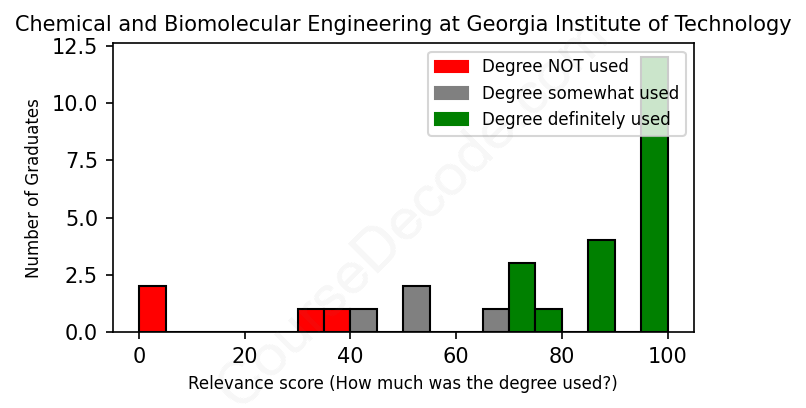
First, some facts. Of the Chemical and Biomolecular Engineering graduates from Georgia Institute of Technology we've analyzed , here's how many have used (or NOT used) their degree in their career:

These are estimates based on AI analysis of 28 LinkedIn profiles (see below).
The verdict? Above average. Overall, with an average relevance score of 75%, Chemical and Biomolecular Engineering graduates from Georgia Institute of Technology have a higher likelihood (+8%) of finding work in this field compared to the average graduate across all fields:
And for comparison, here's the chart for all profiles we've looked at across all degrees.
Also, after graduating, only 28% of these graduates have pursued further education other than another Bachelor's degree (such as a Masters degree or other), compared to the average across all profiles of 35%. This suggests a Bachelors degree is enough for most Chemical and Biomolecular Engineering graduates, and it's normal to look for work straight after graduation.
See the details:
|
Relevance score: 31% We think this person has NOT gone into a career related to their degree. We think this person has NOT gone into a career related to their degree.
DEGREE INFOGraduated in 2017 from Georgia Institute of Technology with a Bachelor of Science - BS in Chemical and Biomolecular Engineering. Also pursued further education since (see below). JOB HISTORY SINCE GRADUATIONVP of Technology Vivint Oct 2017 - Jul 2018 VP, Enterprise Solution  Micron Technology Jul 2018 - Oct 2019 Chief Information Officer, CVP  Micron Technology Oct 2019 - Jul 2020 Non-Executive Directors  Micron Technology Jul 2020 - Present Product Engineer  Koppers Performance Chemicals Jul 2017 - Present FURTHER DEGREES DONE SINCE GRADUATINGMBA, Finance, operationsVanderbilt University - Owen Graduate School of Management 2016 - 2018 ABOUTChemical Engineering major at Georgia TechProcess Engineer at goPine |
The top 10 most common jobs done by the graduates we've analyzed (ranked most common to least) are:
From analyzing the LinkedIn profiles of graduates from Georgia Tech's Chemical and Biomolecular Engineering program, it seems there are a few common pathways they have taken after graduation. A significant number of alumni have continued onto roles as Process Engineers, Technical Managers, and Engineers in various industries like oil and gas, pharmaceuticals, and manufacturing. These positions typically involve utilizing core skills and knowledge from their degree directly, making them highly relevant to the field of chemical engineering. Many have thrived in roles that emphasize process improvement, production management, and product development, which closely tie back to the principles they studied.
However, not all career paths taken by these graduates align neatly with their educational background. Some have ventured into areas like sales, project management, and even law, where the direct application of chemical engineering skills might be minimal or even absent. Positions such as account managers or consultants may still benefit from analytical and problem-solving skills honed during their engineering studies, but they tend to be less specific to chemical and biomolecular engineering. Overall, while there's a robust group that remains true to chemical engineering principles in their careers, a notable portion of graduates ends up in roles that diverge from those core competencies.
Here is a visual representation of the most common words in job titles for Chemical and Biomolecular Engineering graduates (this is across all Chemical and Biomolecular Engineering graduates we've analyzed, not just those who went to Georgia Institute of Technology):

Graduates from the Chemical and Biomolecular Engineering program at Georgia Tech seem to have embarked on a variety of interesting careers that are generally relevant to their field. When looking at their first jobs, many start off as process engineers or technical roles, often in large, well-known companies like DuPont or Intel. This indicates that fresh graduates are likely to get solid positions that leverage their engineering skills right out of college. For instance, several of them have taken on roles at major organizations where they focus on process optimization, product development, and technical consulting, which makes sense given their educational background.
Fast forward five to ten years, and many of these grads have climbed the career ladder quite successfully. A lot of them continue to hold engineering or management positions, reflecting their career growth in the industry. Some even transition to management roles or new verticals, like product management or sales, where they utilize their technical expertise in a business context. While there are a few exceptions—like a couple of individuals moving into unrelated fields—the majority seem to thrive within the realms of engineering, R&D, and technical consulting. Overall, it looks like attending Georgia Tech prepares these graduates well for a promising career trajectory in engineering and technology sectors. So if you're considering a path in Chemical and Biomolecular Engineering, it seems like a solid choice with plenty of opportunities ahead!
Honestly, a Bachelor’s degree in Chemical and Biomolecular Engineering is known to be pretty challenging, especially at a renowned school like Georgia Tech. The curriculum is packed with tough subjects like thermodynamics, fluid mechanics, and chemical reaction engineering, along with advanced math and chemistry classes. If you’re not super into those subjects or don’t enjoy rigorous problem-solving, it could feel pretty overwhelming at times. But if you're passionate about the field and willing to put in the work, it's definitely doable; just be prepared for those late nights of studying and group projects! Generally speaking, this major tends to be tougher than average, but many students find it rewarding if they stick with it.
Most commonly, in the LinkedIn profiles we've looked at, it takes people 4 years to finish a Bachelor degree in Chemical and Biomolecular Engineering.
Looking at the career paths of these Georgia Tech Chemical and Biomolecular Engineering grads, it seems like they’re doing pretty well when it comes to making money. Many of them have landed solid positions at reputable companies like DuPont, VMware, and Procter & Gamble, which typically offer good salaries and benefits. Some have even climbed the corporate ladder quickly, moving from entry-level roles to management positions or specialized technical roles. Additionally, we see a mix of fields like engineering, project management, and even law, which all can be quite lucrative. So overall, it looks like these folks are on track for decent earnings, especially compared to the average starting salary for new grads.
Here is a visual representation of the most common words seen in the "about" section of LinkedIn profiles who have a Bachelor degree in Chemical and Biomolecular Engineering (this is across all Chemical and Biomolecular Engineering graduates we've analyzed, not just those who went to Georgia Institute of Technology). This may or may not be useful:

Here are all colleges offering a Bachelor degree in Chemical and Biomolecular Engineering (ordered by the average relevance score of their Chemical and Biomolecular Engineering graduates, best to worst) where we have analyzed at least 10 of their graduates:
| College | Score | Count |
|---|---|---|
 Georgia Institute of Technology Georgia Institute of Technology
|
75 | 28 |
 The Johns Hopkins University The Johns Hopkins University
|
75 | 11 |